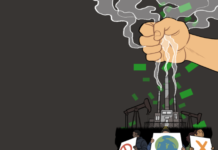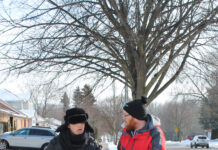Yesterday afternoon, UW hosted a town hall about the 2024/25 operating budget, which was approved by the Board of Governors last week. The town hall, which could be joined online or in-person at Needles Hall, followed the release of operating budget constraints and measures and aimed to provide the university community with more information about UW’s financial situation. Present to answer attendees’ questions were UW president Vivek Goel, provost James Rush, and vice-president, administration and finance Jacinda Reitsma.
Goel opened the town hall by speaking about some of the most pressing challenges facing the university, including tuition freezes and student caps. He then went on to speak about the federal government’s recent cap on international study permits: while “in theory” UW will be able to recruit the same number of international students as last year, Goel noted that there is still “a lack of clarity” about what the specific numbers will be. Goel added that in terms of expenses, the cost for employees is the most significant factor.
The 2024 federal budget, however, brought what Goel called “welcome investments” to research and postgraduate fellowships. “These changes don’t have a direct impact on our operating budget, but they certainly help us… engage in our research and recruit the top talent,” he said of the federal funding.
Provost Rush also addressed the nature of the university’s budgeting measures, which he wanted to emphasize are ongoing and multimodal. Rather than being a one-time solution, the 2024/25 budget aims to identify various financial strategies that the university can implement in the coming years.
The panel began by responding to a few commonly asked questions before moving onto specific ones submitted by audience members. One question addressed by Goel was whether UW would consider becoming “leaner at the top” and decrease the number of senior employee positions. Responding to this, Goel said: “All options will be on the table as we move forward, and certainly this would be something that we would look at as an institution.”
Goel noted, however, that the growth of UW’s management has stemmed in part from certain mandates required by the university community and larger governments: “Whether it’s Indigenization, equity, inclusion, anti-racism, student mental health, research security… you can look at all the new areas that we’ve had to continue to adopt and develop, quite rightly.” He added that the university also had to “catch up” to rapidly-growing enrollment numbers, and ensure that proper management structures exist for an institution of UW’s size.
The limited hiring program has proven to be one of the largest areas of concern for the university community, with multiple questions being raised about what it entails and how it might impact current and future employees. Responding to this, Reitsma explained: “The limited hiring program is really intended to ensure that we’re taking a step back. We’re taking a look at [positions] as [they become] vacated… It was not intended to be a rules-based approach where only [certain] types of positions will move forward, but really ensuring [that] there’s a collaborative review of what the positions are.”
Rush also addressed the question of whether the university has any plans to generate further revenue streams to support academic programming in the future. He said that these kinds of discussions are “underway” and that moving forward, the university could consider making “political arguments” for the development of new programming.
As the event wrapped up, Goel mentioned that the university may attempt to schedule another information session due to the audio issues within the livestream. “We know that clarity about [UW’s] direction and decision-making processes are areas that we need to improve on, and that’s why events such as [today’s] are important for us… to hear from you [about] what your questions and concerns are,” he said.
More information from the town hall, including a full transcript of the event, can be found here.































